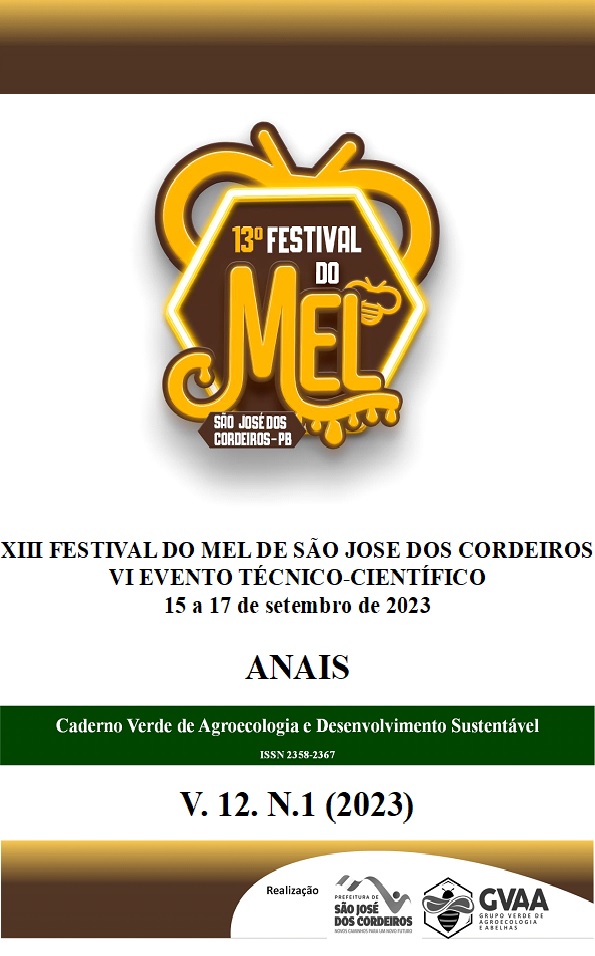Honey pH: A quality criterion neglected by Brazilian legislation
Keywords:
Mel, Legislação do mel, Análises físico-químicas, ApiculturaAbstract
Honey is a natural product produced by bees from the nectar of flowers or secretions from parts of plants. Honey has a number of properties that make it a high value-added food. However, the quality of honey can be affected by various factors, such as botanical origin, processing, etc. One of the physical-chemical parameters that can indicate the quality of honey is pH, which indicates acidity or alkalinity. The aim of this work was to show the pH in the quality of honey sold in the interior of Paraíba and to discuss the absence of this parameter in Brazilian legislation. The physicochemical characteristics of three honey samples collected in three different municipalities in the interior of Paraíba were analyzed. The pH values found were 5.7, 5.4 and 5.2, respectively. These values are within the pH variation range for honey, which is 3.4 to 6.1. The pH of honey is influenced by its botanical origin, the concentration of organic acids and minerals and the maturation process. A high pH can indicate poor honey quality, as it can encourage the development of microorganisms and alter the sensory and nutritional properties of the product. Despite the importance of pH as an indicator of honey quality, this parameter is not covered by Brazilian legislation, which only establishes limits for humidity, free acidity, ash, reducing sugars and apparent sucrose. This legislative gap can compromise the safety and quality of honey produced and marketed in the country. We conclude that pH is a relevant parameter for assessing the quality of honey and that Brazilian legislation should include it in its identity and quality criteria. It is also recommended that honey producers and consumers pay attention to the pH values of the product and their implications for health.
Downloads
Published
How to Cite
Issue
Section
License
Copyright (c) 2023 Thalison Antunes, Astrid, Kauan, Kenia, Yanara, Alfredina

This work is licensed under a Creative Commons Attribution 4.0 International License.
Termo de cessão de direitos autorias
Esta é uma revista de acesso livre, em que, utiliza o termo de cessão seguindo a lei nº 9.610/1998, que altera, atualiza e consolida a legislação sobre direitos autorais no Brasil.
O(s) autor(es) doravante designado(s) CEDENTE, por meio desta, publica a OBRA no Caderno Verde de Agroecologia e Desenvolvimento Sustentável, representada pelo Grupo Verde de Agroecologia e Abelhas (GVAA), estabelecida na Rua Vicente Alves da Silva, 101, Bairro Petrópolis, Cidade de Pombal, Paraíba, Brasil. Caixa Postal 54 CEP 58840-000 doravante designada CESSIONÁRIA, nas condições descritas a seguir:
O CEDENTE declara que é (são) autor(es) e titular(es) da propriedade dos direitos autorais da OBRA submetida.
O CEDENTE declara que a OBRA não infringe direitos autorais e/ou outros direitos de propriedade de terceiros, que a divulgação de imagens (caso as mesmas existam) foi autorizada e que assume integral responsabilidade moral e/ou patrimonial, pelo seu conteúdo, perante terceiros.
O CEDENTE mantêm os direitos autorais e concedem à revista o direito de divulgação da OBRA, com o trabalho simultaneamente licenciado sob a Licença Creative Commons do tipo atribuição CC-BY.
O CEDENTE têm autorização para distribuição não-exclusiva da versão do trabalho publicada nesta revista.
O CEDENTE têm permissão e são estimulados a publicar e distribuir seu trabalho online (ex.: em repositórios institucionais ou na sua página pessoal) a qualquer ponto antes ou durante o processo editorial, já que isso pode gerar alterações produtivas, bem como aumentar o impacto e a citação do trabalho publicado.








